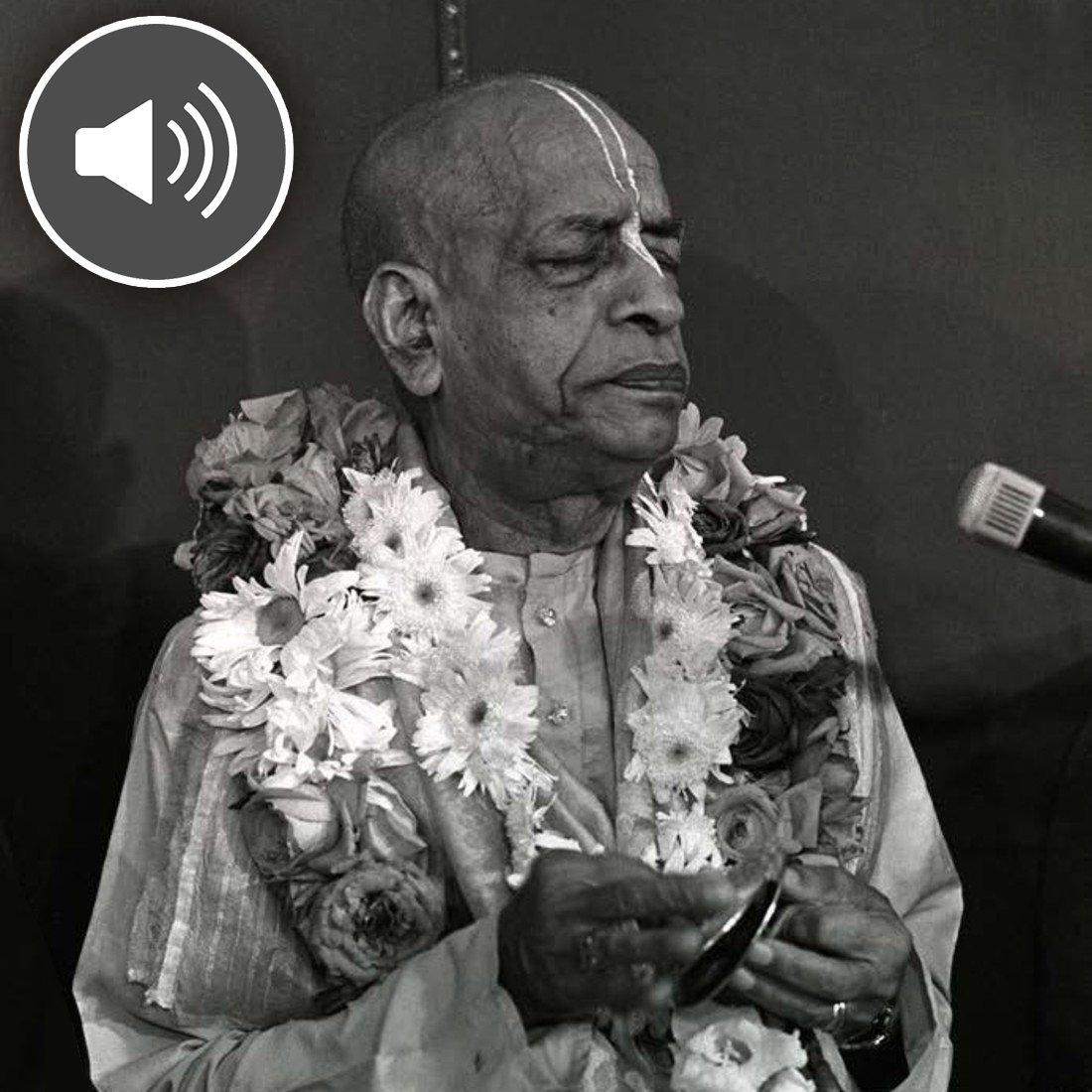
Srila Prabhupada
I think by the beginning of December, 1936, I wrote one letter to Guru Mahārāja. I knew he was little kind upon me, so I wrote that "Guru Mahārāja, you have got many disciples. I am also one of them. But they are doing direct service to you. There some of them are brahmacārīs, some of them sannyāsīs, but I am a householder. I cannot . . ." Of course, I was giving sometimes some monetary help, but I could not give any direct service, so I asked him that, "If there is any particular service I can do for you?"
So that letter was replied in 13th December, dated 13th December, from Purī. And he passed away on the 31st December. Just a fortnight before. So the reply was the same as he wanted me to do this preaching work in 1922, when I first met him that, "You try to preach whatever you have learned from me, the English-knowing people in English. That will do good to you and to the people to whom you shall preach. That is my instruction." So I took up that . . . and then he passed away in 1936, 31st December.
(690207 - Lecture Festival Appearance Day, Bhaktisiddhanta Sarasvati - Los Angeles)
So Śrī Caitanya Mahāprabhu was a great scholar. There is no doubt of it. But in spite of His becoming a great scholar, He is presenting Himself as a great fool. He says: “My Guru Mahārāja saw Me a great . . .” Even one is very great scholar, he has to abide by the decision of his spiritual master. Even one is very great scholar, and if his spiritual master says that “You are a great fool,” he should accept it. This is called full surrender. For example, I’ll give you a practical . . . my Guru Mahārāja was very great scholar, and his Guru Mahārāja, from literary point of view, he could not even sign his name, Gaura-kiśora dāsa Bābājī Mahārāja. And Bhaktivinoda Ṭhākura asked Bhaktisiddhānta Sarasvatī Ṭhākura to accept Gaura-kiśora dāsa Bābājī Mahārāja as his . . . as his spiritual master, that “You go and take your initiation from Gaura-kiśora dāsa Bābājī Mahārāja.” So he thought that “I am a great scholar, and I am son of a magistrate, Bhaktivinoda Ṭhākura, and great Vaiṣṇava. He’ll be very much pleased to accept me.” Of course, he was very much pleased. But in the beginning he refused. He refused. Because . . . of course, that is only show—he was not proud—just to teach us. Bhaktisiddhānta Sarasvatī explained that, “I was little proud. So I was thrice refused by Guru Mahārāja,” although he was the only disciple.
So the scholarship is not a qualification of becoming devotee. That is Caitanya Mahāprabhu’s teaching. Scholarship may help, but it is not necessary. Real necessary is that one should be humble and meek and follow the instruction of the spiritual master. This is real qualification.
(740313 – Lecture CC Adi 07.91-2 – Vrndavana)
There are many devotees, they’re illiterate practically. They do not know what is Vedānta-sūtra. But still, by their sincere devotional service they’re very much elevated. What to speak of others, Gaura-kiśora dāsa Bābājī Mahārāja. Gaura-kiśora dāsa Bābājī Mahārāja, he was illiterate. He could not sign even his name. But he was so spiritually elevated that my spiritual master, who was the topmost scholar of his time, he accepted him as spiritual master.
What is the reason? The reason is that this transcendental science does not depend on academic qualification. It is . . . it is not that because one is very . . . academically very qualified, he’ll become a devotee. No. The secret is . . . that is given in the Vedic literature (SB 5.18.12) yasyāsti bhaktir bhagavaty akiñcanā. No.
yasya deve parā bhaktir
yathā deve tathā gurau
tasyaite kathitā hy arthāḥ
prakāśante mahātmanaḥ
(Svetasvatara Upanisad 6.23)
The transcendental knowledge becomes revealed. To whom it becomes revealed? It becomes revealed to such person who has got unflinching love for Kṛṣṇa and for the spiritual master. Caitanya-caritāmṛta also says, guru-kṛṣṇa-kṛpāya pāya bhakti-latā-bīja (CC Madhya 19.151). One can come to the spiritual perfectional stage, or come to the spiritual platform, by the mercy of Kṛṣṇa and the spiritual master.
(690610 – Lecture SB 01.05.11-12 – New Vrindaban, USA)
So one may question that, "Your Guru Mahārāja was sitting on the ground in a municipal lavatory . . ." Because he did not like that, "Anybody should disturb me," he was sitting by the side of municipal lavatory. Because so many people will come for darśana and āśīrvāda, he did not like it. He did not like to be disturbed by these āśīrvāda. You see? "They will not take any spiritual instruction. They are thinking that, 'Here is a saintly person, and he'll bless me. So I have got now one thousand; I'll tell ten thousand.' That's all. Therefore they come. They do not come to take any spiritual instruction. Therefore it is botheration. It is botheration." So Gaura-kiśora dāsa Bābājī Mahārāja did not like this botheration. He was sitting by the side of a municipal lavatory so that "These rascal will not come out of the bad smell and will not disturb me." You see?
So Mahārāja Maṇīndrānandī, he was one of the . . . he had organized one saṅkīrtana festival. So he came to Gaura-kiśora dāsa Bābājī Mahārāja and to invite him. So after many requests, Gaura-kiśora dāsa Bābājī Mahārāja said, "Mahārāja, you have got many tenants. You are Mahārāja. Why you are trying to make me your tenant? Because you are rich man, you also want . . . as your tenants carries your order, so you also want me. So why you are . . .?" "No, sir, no. You are my lord. Whatever you say, I shall carry out." "Will you carry out?" "Why not?" So he said that, "Don't go home. Sit down here. Chant Hare Kṛṣṇa." He fled away. (laughs) You see. So he was very humorous also, Gaura-kiśora dāsa Bābājī, that "If you are so obedient, then I ask you, 'Don't go home. Better give up your dress and chant Hare Kṛṣṇa here.' "
(741006 - Lecture SB 01.08.26 - Mayapur)
Because Kṛṣṇa, Caitanya Mahāprabhu, does not give anything else. Simply directly gives you Kṛṣṇa and His love. And to award this greatest benediction to the human society, He took sannyāsa at the age of twenty-four years only, in this land of Māyāpur, Navadvīpa. It is very glorified place. It is not ordinary place. Therefore Narottama dāsa Ṭhākura says, gauḍa maṇḍala bhūmi, yeba jane cintāmaṇi tara hoy vrajabhūme vāsa. Anyone who understands gauḍa maṇḍala bhūmi in Bengal—this Navadvīpa, Navadvīpa-candra, Śrī Caitanya Mahāprabhu—if anyone understands the spiritual value of this land, he lives in Vrajabhūmi, in Vṛndāvana. There is no difference between Vṛndāvana and this Gaura-maṇḍala-bhūmi. That is the verdict of the śāstra.
(740302 - Lecture CC Adi 07.02 - Mayapur)
And I was dreaming that, "Bhaktisiddhānta Sarasvatī Ṭhākura is calling me, 'Please come out with me!' " (break) So I was sometimes horrified, "Oh, what is this? I have give up my family life? Bhaktisiddhānta Sarasvatī Ṭhākura is calling me? I have to take sannyāsa?" Oh, I was horrified. But I saw several times, calling me. So anyway, it is by his grace I was forced to give up my family life and so-called business life. And he brought me some way or other in preaching his gospel.
So this is a memorable day. What he desired, I am trying little bit, and you are all helping me. So I have to thank you more. You are actually representative of my Guru Mahārāja (starts to cry) . . . because you are helping me in executing the order of my Guru Mahārāja. Thank you very much.
(731213 - Lecture Festival Disappearance Day, Bhaktisiddhanta Sarasvati - Los Angeles)
The sādhu, a saintly person, does not like that anyone should be killed, even an ant.” That is sādhu. A sādhu does not want to kill even an ant. But in the case of vṛścika-sarpa-hatyā, they are happy. They are happy. Vṛścika, scorpion, and sarpa.
So long, long ago, sometimes in the year 1933 in this Caitanya Maṭha, there was a big snake came out in my front. I was taking bath. So everyone was looking what to do. So Guru Mahārāja was on the upstair. He immediately ordered, “Kill him.” So it was killed. So at that time, 1933, I was newcomer. So I thought, “How that Guru Mahārāja ordered this snake to be killed?” I was little surprised. But later on, when I saw this verse, I was very glad. Modeta sādhur api vṛścika-sarpa-hatyā (SB 7.9.14). It remained a doubt, “How Guru Mahārāja ordered a snake to be killed?” But when I read this verse I was very much pleased, that these creatures, or creatures like the snake, they should not be shown any mercy. No. And Cāṇakya Paṇḍita said there are two kinds of cruel creatures. One kind is a sarpaḥ krūraḥ. The snake is very cruel. Sarpaḥ krūraḥ, khalaḥ krūraḥ. And khala, a person who has awakened the quality like snake . . . then there is no fault. Why a snake is called so cruel? Because unnecessarily they bite. If somebody commits some offense unto you, if you bite me, that is reasonable. But I have no fault, but you are biting me. The vṛścika, scorpion, and snake, they do that, without any offense. A man is passing, an animal is passing—unnecessarily it bites, without offense. A man is sleeping—it bites. Therefore they are very dangerous. Similarly, there are men also like the snake—without any fault they bite. Without any fault. If I do something faulty, you can punish me, bite. But without any fault, if you bite me . . . so therefore Cāṇakya Paṇḍita says, sarpaḥ krūraḥ-khalaḥ krūraḥ sarpāt krūrataraḥ khalaḥ. Such person is called khala, envious, jealous.
(760221 – Lecture SB 07.09.14 – Mayapur)
